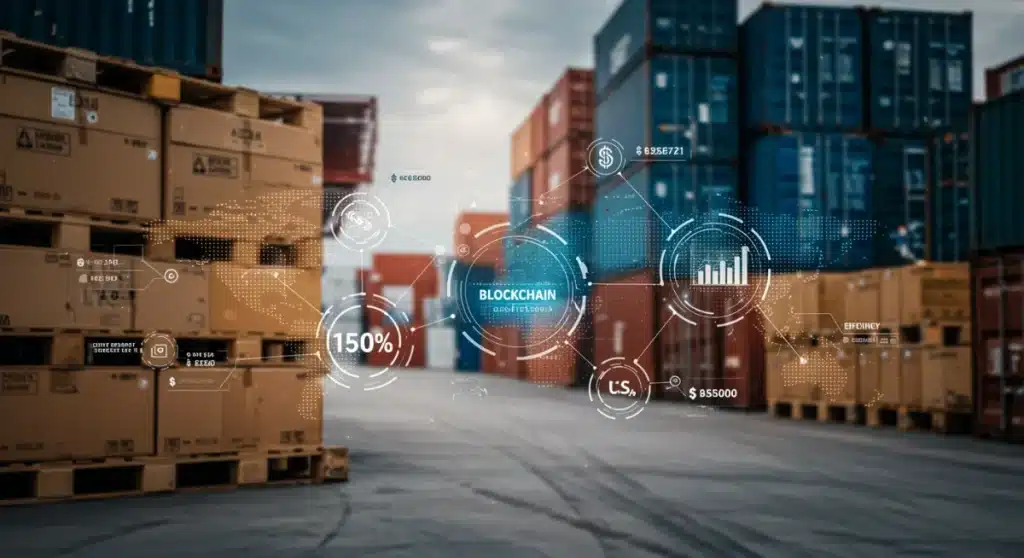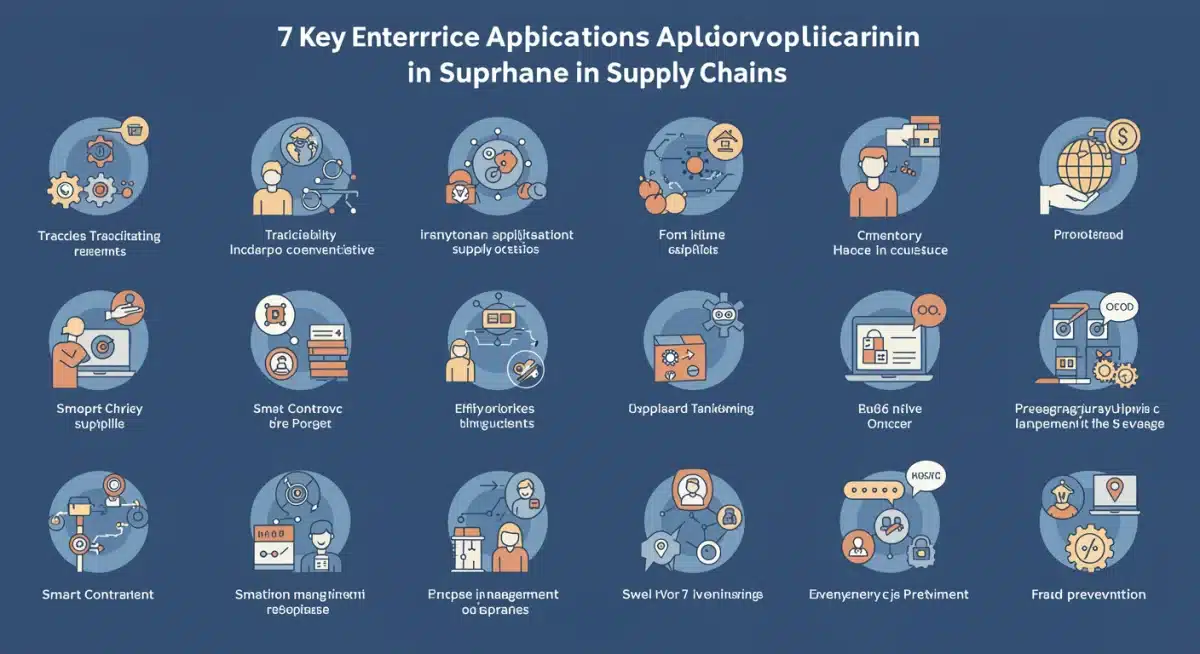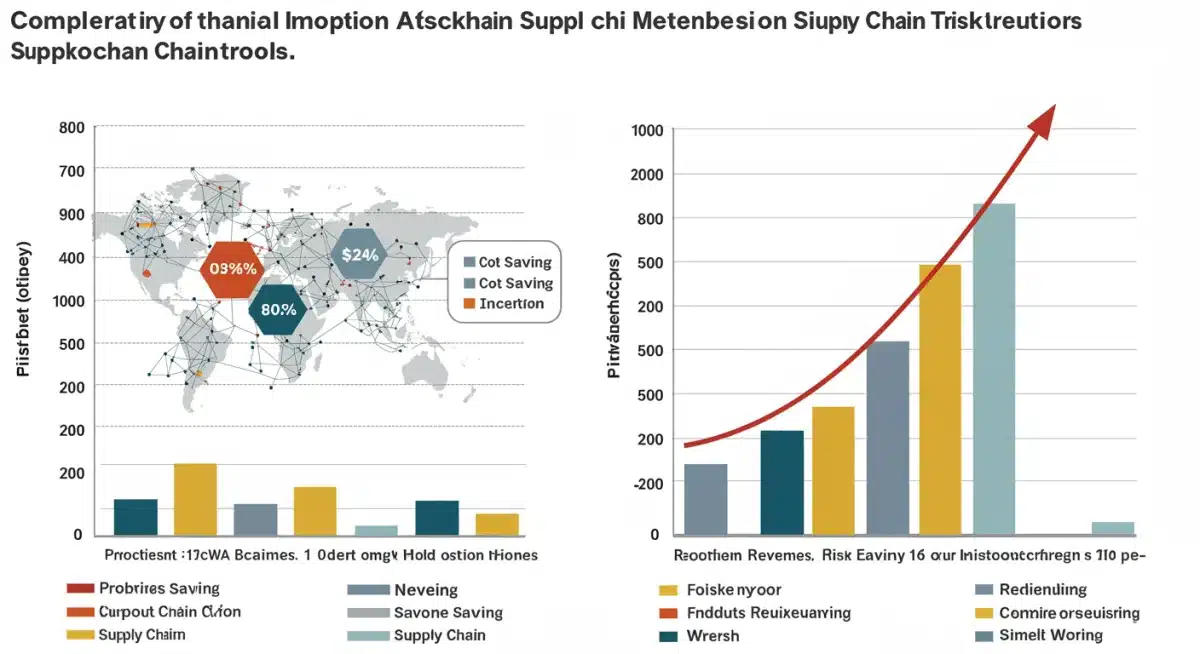Blockchain Beyond Crypto: 7 Enterprise Apps Boost US Supply Chains 20% by 2025

Blockchain Beyond Crypto: 7 Enterprise Applications Driving 20% Efficiency Gains in U.S. Digital Supply Chains by 2025 (FINANCIAL IMPACT, COMPARISON/ANALYSIS) is rapidly transforming how goods move, offering unprecedented transparency and efficiency, with industry leaders projecting substantial operational improvements and financial returns.
The landscape of global commerce is currently undergoing a profound transformation, spearheaded by the quiet but powerful emergence of blockchain technology beyond its cryptocurrency origins. In the United States, particularly, industry experts and analysts are zeroing in on how blockchain enterprise supply chains are set to redefine operational paradigms. This isn’t merely about incremental improvements; detailed projections indicate that seven core enterprise applications of blockchain are poised to drive an impressive 20% efficiency gain in U.S. digital supply chains by 2025, bringing with it significant financial impacts and a new era of trust and transparency.
The Unseen Revolution: Blockchain’s Role in Modern Supply Chains
Blockchain’s inherent characteristics of immutability, transparency, and decentralization are proving to be game-changers for the complex, multi-party environment of supply chains. As digital transformation accelerates, the demand for robust, secure, and verifiable data flows has never been higher. Traditional supply chain systems, often fragmented and opaque, are struggling to keep pace with these demands, leading to inefficiencies, increased costs, and vulnerabilities.
The shift towards blockchain-enabled solutions offers a direct answer to these challenges. By providing a shared, tamper-proof record of transactions and events, blockchain fundamentally alters how information is managed and trusted across the entire supply chain ecosystem. This foundational change is not just theoretical; it is already yielding tangible benefits in pilot programs and early adoptions within the U.S. market, setting the stage for widespread implementation by the middle of the decade.
The integration of blockchain technology is moving beyond pilot phases, with early adopters reporting significant improvements in data integrity and operational visibility. This shift is critical for U.S. businesses looking to maintain a competitive edge in a globalized economy, ensuring that their supply chains are not only resilient but also optimized for future demands.
Enhanced Traceability and Transparency: A Core Application
One of the most immediate and impactful applications of blockchain in enterprise supply chains is the dramatic improvement in traceability and transparency. Consumers and regulators alike are demanding greater insight into the origin, journey, and authenticity of products. Traditional methods often rely on siloed databases and manual checks, making comprehensive tracking cumbersome and prone to error.
Blockchain provides an end-to-end, immutable record of a product’s lifecycle, from raw material sourcing to final delivery. Each step in the supply chain—manufacturing, packaging, shipping, customs clearance—can be recorded as a block on the chain, creating a transparent and verifiable history. This level of detail is invaluable for quality control, regulatory compliance, and combating counterfeiting, which costs U.S. businesses billions annually.
Real-time Product Tracking
Companies can now track products in real-time, offering unprecedented visibility. This capability allows for quicker identification of issues, such as delays or quality deviations, and enables proactive responses. For instance, in the food industry, rapid traceability can significantly reduce the impact of contamination outbreaks by pinpointing affected batches instantly.
- Instant verification of product origin and journey.
- Reduced risk of counterfeiting and illicit goods entering the market.
- Improved compliance with complex regulatory requirements.
- Enhanced consumer trust through verifiable product information.
The financial implications are clear: reduced losses from fraud, fewer product recalls, and stronger brand reputation. This enhanced transparency is not just a ‘nice-to-have’ but a fundamental requirement for modern commerce, directly contributing to the projected 20% efficiency gains in U.S. digital supply chains.
Smart Contracts for Automated Operations and Payments
Smart contracts represent another pivotal blockchain application, automating and self-executing agreements within the supply chain. These digital contracts, stored on the blockchain, automatically trigger actions when predefined conditions are met, eliminating the need for intermediaries and manual processing. This automation streamlines numerous processes, from order placement and inventory management to payments and logistics.
Consider a scenario where a payment to a supplier is automatically released once a shipment is verified as delivered and inspected, all without human intervention. Such automation significantly reduces administrative overhead, minimizes disputes, and accelerates transaction cycles. The removal of manual checks and balances also mitigates the risk of human error and fraud, making the entire process more secure and efficient.

Streamlining Trade Finance
In trade finance, smart contracts can unlock capital more quickly and efficiently. Letters of credit and other complex financial instruments can be digitized, allowing for faster settlement and reduced financing costs. This accelerates cash flow for businesses, particularly small and medium-sized enterprises (SMEs) that often face delays in receiving payments.
The ability to automate and verify contractual obligations through smart contracts introduces a new level of operational fluidity. This not only speeds up processes but also frees up resources that can be reallocated to more strategic initiatives, directly contributing to the overall efficiency improvements anticipated across U.S. digital supply chains.
Optimized Inventory Management and Demand Forecasting
Effective inventory management is crucial for supply chain health, yet it remains a significant challenge for many businesses. Inaccurate inventory data can lead to overstocking, stockouts, and increased carrying costs. Blockchain technology offers a solution by providing a single, shared, and continuously updated view of inventory levels across all nodes in the supply chain.
By integrating blockchain with IoT devices, real-time data on stock levels, location, and condition can be recorded and verified instantly. This granular visibility allows for more precise demand forecasting, reducing waste and optimizing warehouse space. Companies can move from reactive inventory management to a proactive, data-driven approach, minimizing capital tied up in excess stock and ensuring product availability.
The financial benefits are substantial: lower storage costs, reduced obsolescence, and improved customer satisfaction due to fewer stockouts. This optimization directly impacts the bottom line and is a key driver for the projected 20% efficiency gains in U.S. digital supply chains by 2025.
Combating Fraud and Enhancing Supply Chain Security
Supply chain fraud, ranging from product counterfeiting to cargo theft and data manipulation, poses a pervasive threat to businesses and consumers. Blockchain’s cryptographic security features make it an ideal tool for bolstering supply chain security, creating a robust defense against various forms of illicit activity.
The immutable ledger ensures that once data is recorded, it cannot be altered without detection, making it extremely difficult for malicious actors to tamper with records of origin, ownership, or transaction details. This inherent security drastically reduces the risk of fraud, protecting both intellectual property and the integrity of goods.
Secure Data Sharing and Authentication
Blockchain enables secure data sharing among authorized participants without exposing sensitive information to unauthorized parties. This is critical for authentication processes, ensuring that only genuine products reach the market and that all participants in the supply chain are legitimate. The ability to verify credentials and transactions cryptographically builds a foundation of trust that traditional systems often lack.
- Immutable records prevent data tampering and fraud.
- Enhanced security for intellectual property and product authenticity.
- Secure, permissioned data sharing among trusted partners.
- Reduced financial losses from cargo theft and counterfeiting.
The financial impact of reducing fraud is immense, translating into direct cost savings and safeguarding revenue streams. For U.S. businesses, this means greater confidence in their operations and a stronger competitive position.
Streamlining Customs and Regulatory Compliance
Navigating international trade involves a labyrinth of customs procedures, regulatory requirements, and extensive documentation. Delays and errors in these processes can significantly impede the flow of goods, increasing costs and lead times. Blockchain technology offers a powerful solution by digitizing and streamlining these complex cross-border operations.
By creating a shared, verifiable ledger for all trade-related documents and approvals, blockchain can accelerate customs clearance and ensure compliance with various international standards. All necessary permits, certificates, and declarations can be securely stored and accessed by authorized customs officials and trade partners, reducing manual paperwork and potential discrepancies.

Faster Cross-Border Transactions
The automation of data verification and the secure exchange of information lead to faster processing times at borders. This not only reduces demurrage charges and storage costs but also allows products to reach their destinations more quickly, improving overall supply chain responsiveness. The enhanced transparency also makes it easier to demonstrate compliance during audits, minimizing penalties and legal issues.
The financial benefits extend to reduced operational costs, faster market entry, and improved relationships with regulatory bodies. As U.S. digital supply chains increasingly operate on a global scale, the ability to streamline customs and compliance through blockchain will be a critical factor in achieving the projected 20% efficiency gains.
Improved Collaboration and Data Sharing Among Partners
One of the persistent challenges in traditional supply chains is the lack of seamless collaboration and trust among disparate partners. Each entity often operates with its own systems and databases, leading to information silos, data inconsistencies, and difficulties in coordinating efforts. Blockchain fundamentally addresses this by providing a neutral, shared platform for data exchange.
A permissioned blockchain network allows supply chain participants—manufacturers, logistics providers, distributors, retailers—to share relevant data securely and transparently. This shared source of truth eliminates discrepancies, fosters greater trust, and enables more effective planning and problem-solving. All partners operate from the same, verified information, leading to better decision-making and optimized collective performance.
Building a Network of Trust
The decentralized nature of blockchain means no single entity controls the data, promoting a more equitable and collaborative environment. This fosters stronger relationships among partners, as each can verify the actions and data of others without relying on a central authority. This level of collaboration is essential for creating resilient and agile supply chains capable of responding to disruptions and evolving market demands.
The financial impact of improved collaboration includes reduced communication overhead, fewer disputes, and the ability to collectively optimize processes for greater efficiency. This application is vital for unlocking the full potential of blockchain in U.S. digital supply chains, contributing significantly to the ambitious 20% efficiency target.
Enhanced Sustainability and Ethical Sourcing Verification
As corporate social responsibility gains prominence, consumers and stakeholders are increasingly demanding transparency regarding the environmental and ethical practices within supply chains. Verifying sustainability claims and ethical sourcing can be incredibly complex using traditional methods, often relying on self-reporting and infrequent audits.
Blockchain offers a powerful tool for authenticating sustainability and ethical sourcing claims. By recording every step of a product’s journey—from the origin of raw materials to labor conditions at manufacturing facilities—on an immutable ledger, companies can provide verifiable proof of their commitments. This allows for transparent tracking of environmental impacts, fair labor practices, and adherence to ethical standards.
Driving Green Supply Chain Initiatives
For instance, a blockchain can track the carbon footprint of each product component or verify that materials are sourced from certified sustainable suppliers. This not only helps companies meet their sustainability goals but also allows them to communicate these efforts authentically to consumers, building brand loyalty and trust. The detailed data provided by blockchain can also facilitate reporting to regulatory bodies and ESG (Environmental, Social, and Governance) investors.
- Verifiable proof of sustainable practices and ethical sourcing.
- Increased consumer trust and brand reputation.
- Streamlined reporting for ESG compliance.
- Support for green supply chain initiatives and carbon footprint reduction.
The financial benefits include enhanced brand value, access to new markets driven by ethical consumerism, and potential reductions in regulatory fines. By enabling verifiable sustainability, blockchain contributes significantly to both the ethical and economic efficiency of U.S. digital supply chains, aligning with broader corporate responsibility trends.
Key Application |
Primary Benefit |
|---|---|
Enhanced Traceability |
Full product lifecycle visibility, fraud reduction. |
Smart Contracts |
Automated agreements, faster payments, reduced intermediaries. |
Inventory Optimization |
Real-time stock data, precise forecasting, lower costs. |
Supply Chain Security |
Immutable records, secure data sharing, fraud prevention. |
Frequently Asked Questions About Blockchain in Supply Chains
The primary financial benefits include reduced operational costs through automation, significant decreases in fraud and counterfeiting losses, optimized inventory carrying costs, faster payment cycles, and improved compliance, collectively boosting profitability and efficiency.
A 20% efficiency gain is projected through increased transparency and traceability, automation via smart contracts, optimized inventory management, enhanced security against fraud, streamlined customs processes, and improved collaboration among supply chain partners.
While highly beneficial, suitability depends on factors like complexity, data volume, and partner willingness. Industries with high-value goods, strict regulatory requirements, or frequent cross-border transactions are often ideal candidates for early adoption and significant impact.
Key challenges include interoperability with existing legacy systems, the need for industry-wide standardization, initial investment costs, managing data privacy, and securing widespread adoption and collaboration among all supply chain participants.
Blockchain offers superior transparency, immutability, and decentralization compared to traditional, often siloed systems. It provides a single source of truth, reducing reliance on intermediaries, enhancing trust, and significantly improving data integrity and operational efficiency across the network.
What Happens Next
The trajectory for blockchain enterprise supply chains in the U.S. is clearly set towards significant growth and integration. As businesses continue to seek competitive advantages and resilience in an unpredictable global economy, the adoption of these seven key applications will accelerate. The next few years will see a critical period of standardization and interoperability development, alongside increasing investment in blockchain infrastructure. Companies that strategically invest in these technologies now will be best positioned to realize the projected 20% efficiency gains, transforming their operations and securing a leading edge in the digital future of commerce. Watch for partnerships and consortia forming to drive industry-wide adoption and further solidify blockchain’s role beyond crypto.